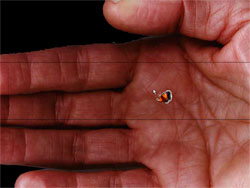|
|
HOME
> STUNNED NETART OPEN
|
|
July 11, 2006
Eveline, fragmentos de una respuesta : Marina Zerbarini
Joyce's "Eveline" relates the history of a young woman who lives with her family in Dublín. The appearance of a man who would take her to live in Buenos Aires awakens in her fantasies about the happy life that she could have there, in opposition to her reality and the relation with her father. The unexpected end, if we can speak of an end in the Joyce´s writing (main motor of this work), opens the game to the interpretative wealth of the reader. "A painful case" relates the life of a single man who is related spontaneously to a married woman. The questions respect to the reason by which Mr. Duffy interrupts that relation are without sufficient answers. These two histories are related semantically to this other Eveline, a problem of sort, inabarcable in their plurality, visual metaphor of several readings. It approaches questions, relative to the affection, the encounter, the transit spaces, the body place. It also reveals the contradictions and/or paradoxes in the obsessive relation man /machine, repetitions in the human conduct and the investigations in the electronics tendientes of life simulation, also the unpredictable thing of the human answers. We could think, from these stories reading, that although the human being can change, the control it dominates its attitudes, it prevents the changes, repeat conducts and it is chosen, perhaps the opposite of which it is desired. According to Derrida, the Greeks concept of democracy was based on the ideas of brotherhood and brotherhood, concepts that did not include the relation with the woman nor between the woman. An almost not modified thought at the present time. |
